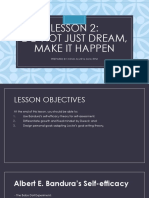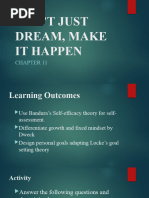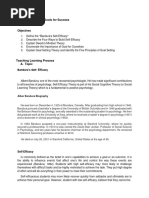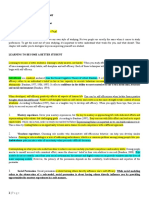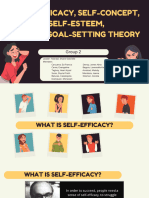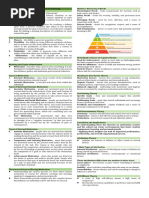MODULE 9 Goal Setting 2023
MODULE 9 Goal Setting 2023
Uploaded by
SeanjinyuCopyright:
Available Formats
MODULE 9 Goal Setting 2023
MODULE 9 Goal Setting 2023
Uploaded by
SeanjinyuCopyright
Available Formats
Share this document
Did you find this document useful?
Is this content inappropriate?
Copyright:
Available Formats
MODULE 9 Goal Setting 2023
MODULE 9 Goal Setting 2023
Uploaded by
SeanjinyuCopyright:
Available Formats
MODULE 9
Goal Setting
The next topic in this module is how to set your goals, but first of course we have to define what is a
GOAL?
Goal is defined as:
Is the object toward which the behavior is directed, usually within a specified period of time.
It motivates people to develop strategies that will enable them to perform better.
Idea of the future or desired result that a person or group of people envision, plan and commit
to achieve.
Goals are being categorized into two
Short term goals- it can be achieved in a day, week or year
Long term goals- usually achieved over a year or more.
FACTORS which may influence Goals
Values- consider to be personally important and worthy. Basis for what is desirable, correct and
good. They act according to the ways that will allow them to express their important value and
attain goals underlying them; gives direction to behavior
Needs-motivates a person to act on something and satisfy that certain need. Needs activate and
direct behavior; categorize into physical and psychological behavior
Rules Of GOAL SETTING
Set goals that are important to you.
Set Specific Measurable Attainable Realistic Time bound- SMART GOALS
Write your life goals
Develop action plan for your future
Start working TODAY
Goal Setting Theory (Edwin A. Locke)
first described that the approach of goal setting theory is based on what Aristotle called
final causality; that is, action caused by a purpose.
It accepts the axiomatic status of consciousness and volition.
It also assumes that introspective reports provide useful and valid data for formulating
psychological concepts and measuring psychological phenomena (e.g., purpose, goal
commitment, self-efficacy).
He then discussed the attributes of goals and his 14 research findings.
Attributes of Goals
(14 Research Findings)
1. The more difficult the goal, the greater the achievement.
2. The more specific or explicit the goal, the more precisely performance is regulated.
3. Goals that are both specific and difficult lead to the highest performance.
4. Commitment to goals is most critical when goals are specific and difficult.
5. High commitment to goals is attained when:
a. the individual is convinced that the goal is important;
b. the individual is convinced that the goal is attainable (or that, at least, progress can be
made toward it).
6. In addition to having a direct effect on performance, self-efficacy influences:
a. the difficulty level of the goal chosen or accepted;
b. commitment to goals;
c. the response to negative feedback or failure; and
d. the choice of task strategies.
7. Goal setting is most effective when there is feedback that shows progress in relation to
the goal.
8. Goal setting (along with self-efficacy) mediates the effect of knowledge of past
performance on subsequent performance.
9. Goals affect performance by affecting the direction of action, the degree of effort
exerted, and the persistence of action over time.
10. Goals stimulate planning in general. Often, the planning quality is higher than that
which occurs without goals. When people possess task or goal-relevant plans as a result
of experience or training, they activate them automatically when confronted with a
performance goal. Newly learned plans or strategies are most likely to be utilized under
the stimulus of a specific, difficult goal.
11. When people strive for goals on complex tasks, they are least effective in discovering
suitable task strategies if:
they have no prior experience or training on the task;
there is high pressure to perform well; and
there is high time pressure (to perform well immediately).
12. Goals (including goal commitment), in combination with self-efficacy, mediate or
partially mediate the effects of several personality traits and incentives on performance.
13. Goal-setting and goal-related mechanisms can be trained and/or adopted in the
absence of training for the purpose of self-regulation.
14. Goals serve as standards of self-satisfaction, with harder goals demanding higher
accomplishment in order to attain self-satisfaction than easy goals. Goals can also be
used to enhance task interest, reduce boredom, and promote goal clarity. When used to
punish or intimidate people, however, goals increase stress and anxiety.
Self-efficacy Theory
(Albert E. Bandura)
based on the assumption that psychological procedures serve as a means of creating and
strengthening expectation of personal efficacy.”
Dr. Bandura defined self-efficacy as “people’s beliefs about their capabilities to produce
designated levels of performance that exercise influence over events that affect their lives.
outcome expectancy is “a person’s estimate that a given behavior will lead to certain
outcomes.”
efficacy expectation is “the conviction that one can successfully execute the behavior
required to produce the outcomes.”
Acts of people with “high assurance in their capabilities”
approach difficult tasks as challenges to be mastered;
set challenging goals and maintain strong commitment to them;
heighten or sustain efforts in the face of failures or setbacks;
attribute failure to insufficient effort or deficient knowledge and skills which are
acquirable; and
approach threatening situation with assurance that they can exercise control over them
Acts of people with “doubt their capabilities”
shy away from tasks they view as personal threats;
have low aspirations and weak commitment to goals they choose to pursue;
dwell on personal deficiencies, obstacles they will encounter, and all kinds of adverse
outcomes, rather than concentrating on how to perform successfully;
slacken their efforts and give up quickly in the face of difficulties;
are slow to recover their sense of efficacy following failure or setbacks; and
fall easy victim to stress and depression.
Four main sources of influence by which a person’s self-efficacy is developed and maintained:
performance accomplishments or mastery experiences;
vicarious experiences;
verbal or social persuasion; and
physiological (somatic and emotional) states.
TWO TYPES OF MINDSETS:
Fixed Mindset
People who believe that success is based on their innate abilities have a “fixed” theory
of intelligence. Fixed-mindset individuals dread failure because it is a negative
statement on their basic abilities
Growth Mindset
people who believe that success is based on hard work, learning, training, and
perseverance have growth theory of intelligence. Individuals do not mind or fear failure
as much because they realize their performance can be improved and learning comes
from failure.
If you plan on being anything less than you are capable of being, you
will probably be unhappy all the days of your life.
-Abraham Maslow-
You might also like
- Setting Goals For Success - 2Document34 pagesSetting Goals For Success - 2Mark Adrian Dave Villanueva88% (16)
- Do Not Just Dream, Make It HappenDocument28 pagesDo Not Just Dream, Make It HappenAshianna Luciel Henituse100% (2)
- New PPT Nursing InfromaticsDocument35 pagesNew PPT Nursing InfromaticsNurul nisa100% (1)
- Human Rights Education CLJ2Document30 pagesHuman Rights Education CLJ2Eugene Bert Santiago100% (1)
- Low Carb For Beginners - Folder - 1803 PDFDocument2 pagesLow Carb For Beginners - Folder - 1803 PDFSupriadibabi100% (2)
- uts reviewDocument5 pagesuts reviewArlyn Mae CabunducanNo ratings yet
- Chapter 3 Lesson 2Document14 pagesChapter 3 Lesson 2Kevin De JesusNo ratings yet
- Lesson 2 DREAM BELIEVE SURVIVEDocument14 pagesLesson 2 DREAM BELIEVE SURVIVEYasmin Pheebie BeltranNo ratings yet
- Do Not Just Dream, Make It Happen: A Group 7 ReportDocument7 pagesDo Not Just Dream, Make It Happen: A Group 7 ReportRyan EstonioNo ratings yet
- Do Not Just Dream, Ma Ke It Happe NDocument25 pagesDo Not Just Dream, Ma Ke It Happe NAshianna Luciel HenituseNo ratings yet
- Uts Module 10 FinalDocument9 pagesUts Module 10 FinalMary Joy BorjaNo ratings yet
- 15-DREAMDocument21 pages15-DREAMAriel RagoNo ratings yet
- Written-Report-JASMINE-2Document7 pagesWritten-Report-JASMINE-2chestercharliealvarezNo ratings yet
- Donotjustdream, MakeitDocument15 pagesDonotjustdream, MakeitIvan D. MosquitoNo ratings yet
- Lesson 11Document19 pagesLesson 11gargolesmaeann12No ratings yet
- Goal Setting and Stress ManagementDocument21 pagesGoal Setting and Stress Managementmocrush2No ratings yet
- Report 8 UtsDocument3 pagesReport 8 UtsMcblng JeehanNo ratings yet
- Written Report2Document6 pagesWritten Report2chestercharliealvarezNo ratings yet
- Managing-and-caring-for-the-self-Do-not-just-Dream-make-it-happenDocument4 pagesManaging-and-caring-for-the-self-Do-not-just-Dream-make-it-happenYeshra BaodtingNo ratings yet
- Managing and Caring For The SelfDocument7 pagesManaging and Caring For The Selfdominic nicart0% (1)
- THSELF1 Unit 3 Chapter 1 PDFDocument7 pagesTHSELF1 Unit 3 Chapter 1 PDFSHIERA MAE AGUSTINNo ratings yet
- Module 15 Factors That Help Achieve Goals Official 1Document25 pagesModule 15 Factors That Help Achieve Goals Official 1aujsc.saldiajhannelNo ratings yet
- 14 Research FindingsDocument2 pages14 Research FindingsSheena Yap Songcuya88% (8)
- Thself NotesDocument4 pagesThself NotesGniese Stephanie Gallema AlsayNo ratings yet
- Chapter 3 Lesson 2 UtsDocument23 pagesChapter 3 Lesson 2 Utsbasidaniela72No ratings yet
- Setting Goals for SuccessDocument22 pagesSetting Goals for Successsamanthaaaa030706No ratings yet
- GOAL-SETTINGDocument54 pagesGOAL-SETTINGcatuiranwilhelmnxeniaNo ratings yet
- Module 15-16 - Setting Goals For SuccessDocument27 pagesModule 15-16 - Setting Goals For SuccessArianne Rose FangonNo ratings yet
- Chapter 13 - Goal SettingDocument43 pagesChapter 13 - Goal SettingHANAH LORAINE LAUREANo ratings yet
- Lesson 11 - Self-EfficacyDocument44 pagesLesson 11 - Self-EfficacyYeonjin C. Choi100% (2)
- Albert E. Bandura's Self-Efficacy: Northwestern University, IncDocument4 pagesAlbert E. Bandura's Self-Efficacy: Northwestern University, IncClenzhéy Althea BalagatNo ratings yet
- UTS-1Document31 pagesUTS-1Ningning PrimNo ratings yet
- Self Regulated Learning HAND OUTDocument4 pagesSelf Regulated Learning HAND OUTJohn Cailen Barceñas IINo ratings yet
- Lesson 3.2 Setting Goals For SuccessDocument46 pagesLesson 3.2 Setting Goals For SuccessJonel MaristelaNo ratings yet
- Module 3Document18 pagesModule 3Dexter AsisNo ratings yet
- Setting Goals for SuccessDocument35 pagesSetting Goals for SuccessMico FortalezaNo ratings yet
- Setting Goals UndsDocument15 pagesSetting Goals UndsBenedict Arcino RodriguezNo ratings yet
- Remmy 18Document5 pagesRemmy 18Leslie bundaNo ratings yet
- Do Not Just Dream Make It HappenDocument3 pagesDo Not Just Dream Make It HappenAera ChoiNo ratings yet
- Module Group 13 Setting Goals For SuccessDocument8 pagesModule Group 13 Setting Goals For SuccessNilrose CostasNo ratings yet
- Group 5 Caring SelfDocument32 pagesGroup 5 Caring SelfShinra KusakabeNo ratings yet
- Setting Goals For SuccessDocument30 pagesSetting Goals For SuccessDrake StreakNo ratings yet
- UNDERSTANDING-LESSON-12-REPORTDocument72 pagesUNDERSTANDING-LESSON-12-REPORToribea412No ratings yet
- Setting Goals For Success PresentationDocument18 pagesSetting Goals For Success PresentationYannie SuaverdezNo ratings yet
- 9th Module Do Not Just Dream Make It HappenDocument4 pages9th Module Do Not Just Dream Make It Happenalexa dawatNo ratings yet
- SETTING GOALS FOR SUCCESSDocument4 pagesSETTING GOALS FOR SUCCESSmareginaangelavelasquezNo ratings yet
- Beige Earthy Mission Vision Values Goals Company Doc 2Document8 pagesBeige Earthy Mission Vision Values Goals Company Doc 2Faye ToqueroNo ratings yet
- Self ReviewerDocument31 pagesSelf ReviewerDelaCruz Nhian Marie TiongsonNo ratings yet
- Understanding The Self - FINAL EXAM Reviewer (AutoRecovered)Document7 pagesUnderstanding The Self - FINAL EXAM Reviewer (AutoRecovered)Yasmin Pheebie BeltranNo ratings yet
- Q3 CGP For Grade 11 Module 6Document4 pagesQ3 CGP For Grade 11 Module 6jessica laranNo ratings yet
- Setting Goals For SucessDocument4 pagesSetting Goals For Sucess2024-109323No ratings yet
- psych of successDocument12 pagespsych of successscribdd1No ratings yet
- 2nd LectureDocument4 pages2nd LectureZeinm KhenNo ratings yet
- Chapter 3 Lesson 10Document2 pagesChapter 3 Lesson 10bonitamichaellaNo ratings yet
- GROUP-13-MODULE-13.pptx 20230915 204222 0000Document29 pagesGROUP-13-MODULE-13.pptx 20230915 204222 0000castromarkallien11No ratings yet
- MODULE 13- UTSDocument12 pagesMODULE 13- UTSeulaliosunshine36No ratings yet
- Lesson 1 3 UTS Ready To PrintDocument8 pagesLesson 1 3 UTS Ready To PrintMaria Julie Flor MacasaetNo ratings yet
- Self Determination TheoryDocument14 pagesSelf Determination Theoryreyanshrajput07No ratings yet
- motivatedDocument2 pagesmotivatedmalbas nesaNo ratings yet
- Managing and Caring For The SelfDocument40 pagesManaging and Caring For The SelfJoshua CuarterosNo ratings yet
- GRP 2 Self-Efficacy, Self-Concept, Self-Esteem, Locke's Goal-Setting TheoryDocument37 pagesGRP 2 Self-Efficacy, Self-Concept, Self-Esteem, Locke's Goal-Setting TheoryOscar the Grouch100% (1)
- FLCT FinalsDocument3 pagesFLCT Finalsmarlwinkylecruz1802No ratings yet
- Physiology and FitnessDocument8 pagesPhysiology and FitnessMuvinda JayasingheNo ratings yet
- DCL Module2Document115 pagesDCL Module2Chajotsuczyzai Reivaj ZenMartNo ratings yet
- Aggravated RobberyDocument6 pagesAggravated Robberyanne100% (2)
- Mosalasuping VS NC HousingDocument29 pagesMosalasuping VS NC Housingkwakhosoxuza02No ratings yet
- MIL - L17 Multimedia Information and MediaDocument24 pagesMIL - L17 Multimedia Information and MediaRalph WPNo ratings yet
- Rffi, &us: QrfrutDocument2 pagesRffi, &us: QrfrutJitendra Kumar SagarNo ratings yet
- IOF Control Descriptions 2024Document32 pagesIOF Control Descriptions 2024Wal BarqNo ratings yet
- COA CIRCULAR NO. 2024 005 March 14 2024Document6 pagesCOA CIRCULAR NO. 2024 005 March 14 2024Jen IgnacioNo ratings yet
- SALIGAN Assessment Report BrieferDocument2 pagesSALIGAN Assessment Report BrieferKikaNo ratings yet
- Ankur AroraDocument3 pagesAnkur AroratvskraoNo ratings yet
- Surya Ashtakam Sanskrit Verses Hindi TranslationDocument5 pagesSurya Ashtakam Sanskrit Verses Hindi TranslationAlok KatiyarNo ratings yet
- Understanding Power and Privilege With Sue RobinsonDocument12 pagesUnderstanding Power and Privilege With Sue RobinsonDamian RadcliffeNo ratings yet
- PetitionDocument6 pagesPetitionHayden SparksNo ratings yet
- Year of Hats March HatDocument4 pagesYear of Hats March HatjaneNo ratings yet
- What We Would Change To Improve SchoolsDocument14 pagesWhat We Would Change To Improve SchoolsMilica IlićNo ratings yet
- SBLC Procedures: Basic Procedures: Sblcs and PofsDocument2 pagesSBLC Procedures: Basic Procedures: Sblcs and PofschachouNo ratings yet
- Multiplication Mania!Document21 pagesMultiplication Mania!Allan EvangelistaNo ratings yet
- Geometrical Transformations PDF FINALDocument107 pagesGeometrical Transformations PDF FINALJohn Paulo Deverso Palma IINo ratings yet
- UTS - Lesson 1 - Perspective of PhilosophyDocument15 pagesUTS - Lesson 1 - Perspective of PhilosophyIra PiguerraNo ratings yet
- Spouses vs. PobocanDocument9 pagesSpouses vs. PobocanRaya Alvarez TestonNo ratings yet
- Soliven v. Makasiar - CaseDocument5 pagesSoliven v. Makasiar - CaseRobeh AtudNo ratings yet
- KICKR App Comparison TableDocument2 pagesKICKR App Comparison TablemvanoudenaardeNo ratings yet
- CA Foundation MTP 2020 Paper 1 AnsDocument9 pagesCA Foundation MTP 2020 Paper 1 AnsSaurabh Kumar MauryaNo ratings yet
- Volume Number 10 Library of Congress ProofDocument100 pagesVolume Number 10 Library of Congress ProofJohn JensonNo ratings yet
- Alchemical MassDocument89 pagesAlchemical Massvyogacharya1040No ratings yet
- Detailed_Advertisement-13-12-2024Document6 pagesDetailed_Advertisement-13-12-2024Nikhil MishraNo ratings yet
- TEST 22Document6 pagesTEST 2231201028782No ratings yet







